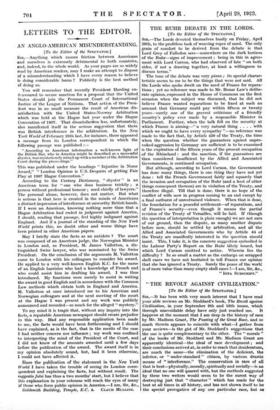THE RUHR DEBATE IN THE LORDS.
[To the Editor of the SPECTATOR.]
SIR,—The Lords devoted themselves busily on Friday, April 20th, to the profitless task of weaving ropes of sand. The only grain of comfort to be derived from the debate is that Lord Grey of Fallodon sees—somewhere on the dark horizon
of the Ruhr—signs of improvement ; being in this in agree- ment with Lord Curzon, who had observed of late " on both sides, if not a drawing together, at least a willingness to discuss terms."
The tone of the debate was very piano ; its special charac- teristic seems to me to be the things that were not said. All the Lords who spoke dwelt on the need of France for repara- tions ; yet no reference was made to Mr. Bonar Law's delibe- rate opinion, expressed in the House of Commons on the first occasion when the subject was discussed, that he did not believe France wanted reparations to be fixed at such an amount that Germany could pay within fifteen or twenty years—surely one of the gravest criticisms of a friendly country's policy ever made by a responsible Minister in Parliament. Further, when the talk fell on the security at which France is aiming—" a very natural thing . . . . with which we ought to have every sympathy "—no reference was made to the fact that, by Article 429 of the Treaty, the time when the question whether the guarantees against unpro- voked aggression by Germany are sufficient is to be examined is the expiration of the fifteen years of the present occupation of the Rhineland : and the sanction, if the guarantees are then considered insufficient by the Allied and Associated Governments, is continued occupation.
But although, according to Lord Curzon, the Government
has done many things, there is one thing they have not yet done : tell the French Government fairly and squarely that the invasion and occupation of the Ruhr (and a host of other things consequent thereon) are in violation of the Treaty, and therefore illegal. Till that is done, there is no hope of the conflict of wills now in progress coming to an end except by a final outburst of unrestrained violence. When that is done, the foundation for a peaceful settlement—of reparations, and of France's security—even though it means the partial revision of the Treaty of Versailles, will be laid. If (though the question of interpretation is plain enough) we are not sure of our ground, then the dispute, as many another dispute before now, should be settled by arbitration, and all the Allied and Associated Governments who by Article 44 of the Treaty are manifestly interested in the question should insist. This, I take it, is the concrete suggestion e,mbodied in the Labour Party's Report on the Ruhr tritely issued, but which Lord Curzon omitted to notice. Wherein lies the difficulty ? In so small a matter as the embargo on scrapped shell cases we have not hesitated to tell France our opinion that she has ignored a Treaty. Surely the peace of the world is of more value than many empty shell cases 1—I am, Sir, &c.,
" IOTA SUBSCRIPT."


















































 Previous page
Previous page